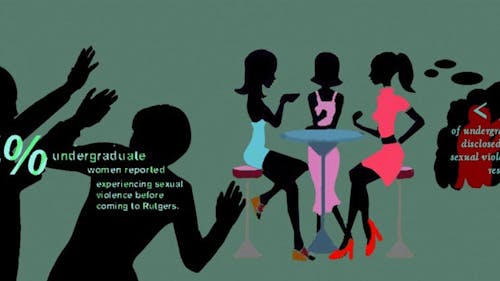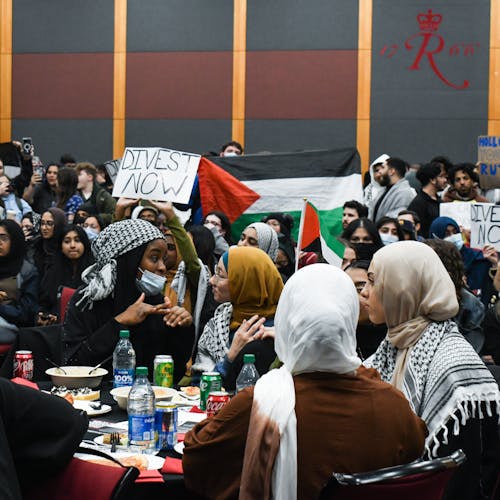Rates of sexual assault at Rutgers consistent with most universities

About 20 percent of undergraduate women at Rutgers—New Brunswick experienced some form of unwanted sexual contact at the University, compared to a 5 percent rate for undergraduate men, according to the latest #iSPEAK campus climate assessment.
This statistic is considered to be consistent with other universities in the United States, said Julia O’Connor, a doctoral student and researcher at the School of Social Work’s Center on Violence Against Women and Children.
“It wasn’t surprising — it was what we expected,” O’Connor said. “It’s unfortunate because anything above 0 (percent) is not a good finding, but it’s in line with what we’re seeing at other institutions.”
Women are always at risk for sexual violence, but younger women — particularly ranging from age 18 to 24 — are at an increased risk, O’Connor said. Women who attend universities are also at an increased risk as well.
The 20 percent sexual assault rate for undergraduate women at Rutgers fits in the low end of the national average, ranging between 19 and 35 percent, according to the #iSPEAK survey. About 24 percent of undergraduate women experienced some form of sexual assault before attending Rutgers.
Arguably, O'Connor said the most concerning #iSPEAK result was how Rutgers students who did not identify as 100 percent heterosexual were two to three times more like to be victimized both before coming to college and since becoming college students.
This figure is considered to be a common finding, but it does indicate that students who identify within the LGBT spectrum are at higher risk for victimization, O’Connor said.
Although she did not make this conclusion based on the #iSPEAK results, O’Connor said she personally believes sexual violence stems from unequal power distribution.
“It’s an even more marginalized community,” she said. “(So) I would think the increased risk of victimization is reflective of a homophobic society.”
Violence against individuals within the LGBT community are perpetrated by those who identify within and outside the spectrum, said Zaneta Rago-Craft, director of the Center for Social Justice Education and LGBT Communities.
“One thing we can all do as a community is listen to and believe survivors when they tell their stories, in addition to familiarizing ourselves with all of the services on campus so that we can all be in the know about guiding those to supportive resources,” Rago-Craft said.
Students should take an active approach for understanding consent, intervening in social settings and being reliable resources for others because student survivors are more likely to tell other students about incidences of victimization, Rago-Craft said.
Friends are usually the first “line of defense” that survivors go to, O’Connor said. About one in five of all Rutgers undergraduates have had another Rutgers student tell them they experienced sexual violence.
Students tend to be reliable sources of support for each other if they respond appropriately to survivors, O’Connor said. This can help victimized individuals in the long term during the recovery process by providing a sense of peer validation.
“All people, of all sexual orientations and gender identities included, can experience violence,” Rago-Craft said. “It is every single one of our responsibilities to interrupt rape culture, and the ways it can show up in our everyday lives.”
Many sexual assault survivors at Rutgers, and beyond, do not tell others of their victimization because they feel ashamed or embarrassed of their circumstances, O’Connor said.
About 77 percent of sexual assault survivors at Rutgers told a close friend about their victimization, indicating that about one-quarter of survivors at the University keeping incidences of unwanted sexual contact a secret, according to the #iSPEAK survey.
“You want to go to somebody you trust,” O'Conner said. “Often these situations involve alcohol, so maybe if the student’s under age, they might not feel comfortable going to the authorities.”
But more Rutgers students are recognizing that this is a problem, and more are also learning about the resources that are available to them, O’Connor said. A large part of the problem is general lack of awareness of campus resources, such as the Office for Violence Prevention and Victim Assistance.
Even though less than 100 percent of students took the survey, the #iSPEAK research team believes they captured the most accurate demographic information regarding sexual assault on the Rutgers—New Brunswick campus, O’Connor said.
The team has faith in the data’s accuracy because students took the #iSPEAK survey anonymously, O’Connor said. The only information that students were required to enter was their RUID or NetID for the purpose of linking demographic information.
“It was an anonymous, confidential survey,” she said. “That type of research has been used and indicates that in general, people are willing to report even shameful or embarrassing events.”
The students and faculty who conducted the #iSPEAK survey would like to return to this subject later to see if the sexual assault statistics at Rutgers have changed, and include dating violence in that research, but nothing has been planned yet, O’Connor said.
“We’re working to build awareness around the issue, (and) some gaps of awareness seen in the survey have been addressed,” O’Connor said. “The climate is about typical. But the response to changing the climate and preventing a climate that fosters sexual violence has been remarkable.”
____
Dan Corey is a Rutgers Business School sophomore majoring in marketing and journalism and media studies. He is the editor-in-chief of The Daily Targum. Follow him on Twitter @danielhcorey for more stories.



